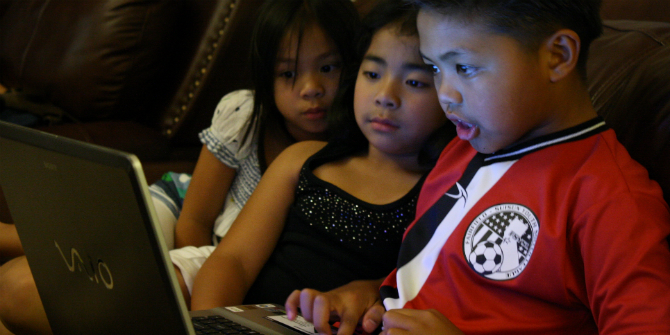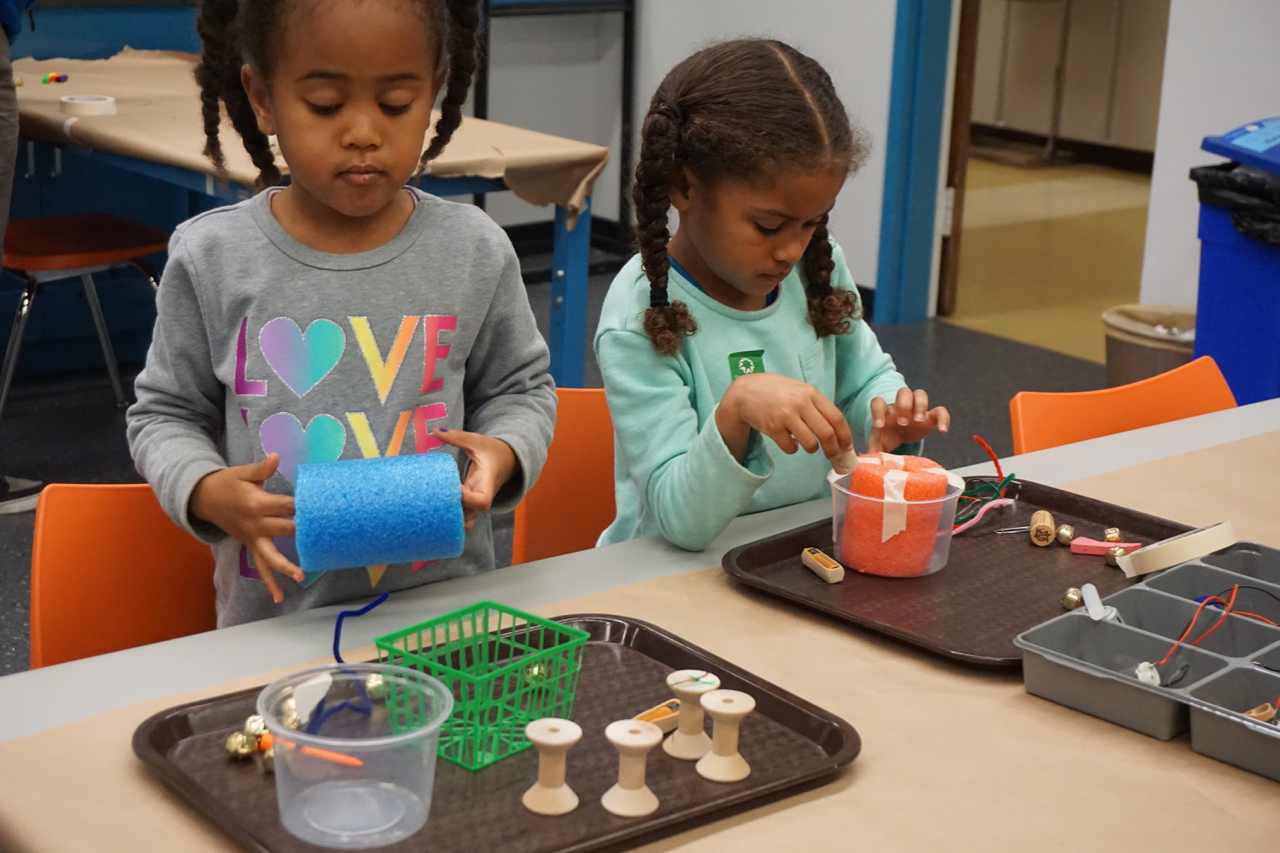 Today is Safer Internet Day, a day when the international community of industry, NGOs, parenting advocates, educators, researchers, parents and young people celebrate what’s good about the internet, and issues a call to action to create a “better internet for everyone, in particular the youngest users.” What better time to take stock of how parents and children are finding some of the best of what the internet has to offer, and to remind ourselves of how parents and children are also working hard to navigate the pitfalls? Sonia Livingstone is Professor of Social Psychology at LSE’s Department of Media and Communications and is the lead investigator of the Parenting for a Digital Future research project. Alicia Blum-Ross is a researcher at the LSE’s Department of Media and Communications, and on the Parenting for a Digital Future project. Jennifer Pavlick has just completed her MSc in LSE’s Department of Sociology and is the editor of the Parenting for a Digital Future blog. [Header image credit: Nate, CC BY-NC 2.0]
Today is Safer Internet Day, a day when the international community of industry, NGOs, parenting advocates, educators, researchers, parents and young people celebrate what’s good about the internet, and issues a call to action to create a “better internet for everyone, in particular the youngest users.” What better time to take stock of how parents and children are finding some of the best of what the internet has to offer, and to remind ourselves of how parents and children are also working hard to navigate the pitfalls? Sonia Livingstone is Professor of Social Psychology at LSE’s Department of Media and Communications and is the lead investigator of the Parenting for a Digital Future research project. Alicia Blum-Ross is a researcher at the LSE’s Department of Media and Communications, and on the Parenting for a Digital Future project. Jennifer Pavlick has just completed her MSc in LSE’s Department of Sociology and is the editor of the Parenting for a Digital Future blog. [Header image credit: Nate, CC BY-NC 2.0]
Today Parenting for a Digital Future is releasing the first in a series of reports from our nationally representative survey of UK parents of children aged 0-17.
Our report reveals how digital media have become integrated into family life – how parents and children use technology to connect, and create, to seek information and learn – but also reveals their worries and what they find challenging. This report complements our on-going qualitative research with parents, which we draw on here to illustrate the survey findings.
We found that parents are broadly optimistic about the role of digital media in their children’s lives, and are turning to the internet for all kinds of parenting dilemmas. However, it also reveals that they are still drastically under-supported when it comes to digital parenting advice. So parents have few resources to turn to either when they or their children run into problems or when they want positive recommendations.
We also found that parents continue to focus on misleading metrics focusing on screen time rather than what kind of digital activities their kids engage in. Importantly, our findings show that:
- Digital media bring families together – through television and movies and playing video games (favoured by fathers). Families turn to digital media to keep in touch, from calls, emails and texts to newer media like messaging apps and video chat.
So, contrary to what panicky headlines might have us believe, rather than displacing established ways of interacting, playing and communicating, digital media sit alongside them but present families with new problems, too.
One father told us that his daughter will:
“Watch the videos where, for instance, they’ll go and play Play-Doh and they’ll make amazing things out of Play-Doh, these adults. And then she’s translated that into doing it on her Barbie doll, so she’ll make beautiful dresses and things out of Play-Doh and dress up Barbie.”
On the other hand, some parents find that digital media interfere with their time with their children. One parent reported:
“I didn’t want to be that parent who is always with my head down, you know, or just when he’s asking me something say, ‘just a minute’… it has to be a very conscious effort because it’s so unconscious now to pick up our phones and just do something.”
- ‘Screen time,’ more than particular digital activities, leads to conflict – screen time does not cause the most conflict in families (sleep and behaviour have that distinction) but it is striking that parents report significantly more conflict about screen time than about how children use the technologies themselves, as shown in the graph below.
One parent said:
“we both work fulltime there are days that we are absolutely exhausted, [so] we’ll ask him, okay, do you want to play [on the tablet for] one hour? But it’s never more than one hour, I feel extremely guilty about that.”
Like many other parents, this family described their sense of “laziness” for letting their child use digital media. However, they also acknowledged the ways in which it eased already-pressured family life.
- Parents are working hard to enable children’s online opportunities, and address risks – with relatively little difference between mothers versus fathers or sons versus daughters, parents engage in a range of enabling (active talking) and restrictive (setting rules, using filters) strategies.
- However, the child’s age makes a big difference. Parents of very young children mostly set screen time rules or use parental controls. Parents of 5-12 year olds and high-income parents are the most active overall, not only setting rules but also encouraging children to explore online.
Another parent told us:
“The computer is a lovely place to have fun, [but] they need to know that there are dangers to it… The same as crossing the road, as long as you know that you could get run over by a car if you don’t cross properly, you can cross the road, just know that there are dangers there.”
Parents described a range of strategies for trying to keep their children safe, at the same time as acknowledging the ways in which digital media have become increasingly integrated into children’s lives.
- Parents lack support for dealing with digital dilemmas – for digital and non-digital dilemmas, online searches are the first port of call for parenting questions. But other sources of support in parents’ lives – partners, friends and relatives, health professionals or a child’s school – are seen as better resources for non-digital questions than digital ones.
- Notably, few parents feel they can turn to their own parents for digital advice, suggesting a generation gap that leaves parents unsupported when it comes to these essential and sometimes divisive issues.
One parent complained:
“Sometimes I’m really pulling my hair out, and think okay, you know, how can we find the right level of exposure? … So we’re constantly finding new rules around electronics and how to use it, and then realise, oh it’s not really working… I think that’s part of the balance, learning to control it, rather than allowing it to control you.”
While another mused:
“I’m quite happy for [my daughter] to use the iPad, as opposed to watching TV, but then sometimes I think, no! The iPad… is it worse?”
These parents, like many others, had questions about what was appropriate for children in terms of time, devices, content, what rules to set and what to let children have access to. But in both of these cases they could identify few ongoing sources of support or advice. The implications of these findings include that, rather than worrying about the catch-all notion of ‘screen time’ it might be better to focus on whether, when and why particular digital activities help or harm individual children.
As we detailed in our policy brief on ‘screen time’ last year, policy makers need to be more proactive in finding ways to reach parents with guidance on digital matters and produce recommendations that are linked to evidence of efficacy, are inclusive and are tailored to the specific ages and needs of individual children.
The full report along with our methods, data tables and questionnaire are available here.
This post gives the views of the authors and does not represent the position of the LSE Parenting for a Digital Future blog, nor of the London School of Economics and Political Science.







